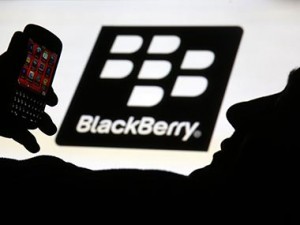Earlier yesterday, BlackBerry announced that it had entered into a definitive agreement to acquire WatchDox, a company based in the US but with R&D facilities in Israel, a country renowned for its security technology firms. If you’re unfamiliar with WatchDox, a consumer alternative to Watchdox is Dropbox, used by millions for its file-sync-and-share through any device, leveraging cloud storage. It’s easy, intuitive and makes file sharing and access from anytime, anywhere a breeze. Dropbox also makes for a great collaboration tool and many employees in many organisations worldwide already use Dropbox to make work easier. But Dropbox’s ease of use is exactly why enterprise security heads are spending sleepless nights wondering about data leaks as important documents go out of the organisation’s network and sphere of control. [caption id=“attachment_1329575” align=“alignnone” width=“300”]
 Representational image: Reuters[/caption] Also, security companies and security leaders are realising that endpoint security, i.e. device security, doesn’t hold all the answers because what is most important is the content residing at the endpoint and content often travels between endpoints and securing the endpoint isn’t enough. Other Enterprise Mobility Management (EMM) players are also in the hunt,
with VMware offering Dropbox-like functionality
in its enterprise mobility suite. VMware’s AirWatch competes with BlackBerry in the MDM space. But according to Moti Rafalin, WatchDox CEO and founder, who is now moving to BlackBerry post-acquisition, there’s one big difference between WatchDox and the others. When files are shared through WatchDox, they retain their security wrappers even after the data leaves the corporate network, which is usually when data is at its most vulnerable. On services like Dropbox, files are usually opened in another application and the user can choose to copy, forward, edit or print, without any need for Dropbox, but on WatchDox, if the security settings on data disallows sharing, copying, printing or editing, etc, the user cannot do anything and work on the document happens within the WatchDox application. Further, in case privileges are changed after the data leaves the corporate network, for instance if the sender removes access for the recipient, the recipient cannot open the file. For BlackBerry, the WatchDox acquisition also plugs a gap in its Enterprise Mobility Management (EMM) portfolio. While BlackBerry has always been renowned for secure e-mail, it brought in secure messaging through BBM Protected and added secure voice with the acquisition of German company Secusmart last year. Secure voice is an area of significant interest for corporates and governments, worried as they are about monitoring of voice calls by dangerous elements or foreign intelligence agencies. Secusmart came to the fore when the German government moved to BlackBerry with Secusmart voice encryption after German Chancellor Angela Merkel’s voice calls were monitored by US spies. There was also the recent revelation of US and British spies hacking into the internal network of Gemalto, one of the largest manufacturers of SIM cards in the world in 2010. The hack gave the US National Security Agency (NSA) and its British counterpart Government Communications Headquarters (GCHQ) access to encryption keys used to protect the privacy of mobile cellular communications across the globe and
India may be one of the countries affected
. Besides secure e-mail, secure messaging and secure voice, BlackBerry need secure enterprise file-sync-and-share (EFSS) and WatchDox plugs that gap. WatchDox will not be available as a preloaded app on BlackBerry smartphones for those consumers who think they’d like a secure option to Dropbox. The enterprise application will be sold as a license/SKU on top of BlackBerry’s BES 12 offering. Businesses will soon be able to buy WatchDox from BlackBerry’s telecom carrier partners. Indeed, BlackBerry’s deep relationships with nearly 600 carriers globally was also what attracted WatchDox to BlackBerry. Currently WatchDox offers its solution only through NTT Docomo in Japan. At the same time, though WatchDox has been acquired by BlackBerry, its relationships and joint offerings with other vendors like Symantec where it is part of Symantec’s Data Loss Prevention (DLP) solution will remain, says Moti Rafalin.
Representational image: Reuters[/caption] Also, security companies and security leaders are realising that endpoint security, i.e. device security, doesn’t hold all the answers because what is most important is the content residing at the endpoint and content often travels between endpoints and securing the endpoint isn’t enough. Other Enterprise Mobility Management (EMM) players are also in the hunt,
with VMware offering Dropbox-like functionality
in its enterprise mobility suite. VMware’s AirWatch competes with BlackBerry in the MDM space. But according to Moti Rafalin, WatchDox CEO and founder, who is now moving to BlackBerry post-acquisition, there’s one big difference between WatchDox and the others. When files are shared through WatchDox, they retain their security wrappers even after the data leaves the corporate network, which is usually when data is at its most vulnerable. On services like Dropbox, files are usually opened in another application and the user can choose to copy, forward, edit or print, without any need for Dropbox, but on WatchDox, if the security settings on data disallows sharing, copying, printing or editing, etc, the user cannot do anything and work on the document happens within the WatchDox application. Further, in case privileges are changed after the data leaves the corporate network, for instance if the sender removes access for the recipient, the recipient cannot open the file. For BlackBerry, the WatchDox acquisition also plugs a gap in its Enterprise Mobility Management (EMM) portfolio. While BlackBerry has always been renowned for secure e-mail, it brought in secure messaging through BBM Protected and added secure voice with the acquisition of German company Secusmart last year. Secure voice is an area of significant interest for corporates and governments, worried as they are about monitoring of voice calls by dangerous elements or foreign intelligence agencies. Secusmart came to the fore when the German government moved to BlackBerry with Secusmart voice encryption after German Chancellor Angela Merkel’s voice calls were monitored by US spies. There was also the recent revelation of US and British spies hacking into the internal network of Gemalto, one of the largest manufacturers of SIM cards in the world in 2010. The hack gave the US National Security Agency (NSA) and its British counterpart Government Communications Headquarters (GCHQ) access to encryption keys used to protect the privacy of mobile cellular communications across the globe and
India may be one of the countries affected
. Besides secure e-mail, secure messaging and secure voice, BlackBerry need secure enterprise file-sync-and-share (EFSS) and WatchDox plugs that gap. WatchDox will not be available as a preloaded app on BlackBerry smartphones for those consumers who think they’d like a secure option to Dropbox. The enterprise application will be sold as a license/SKU on top of BlackBerry’s BES 12 offering. Businesses will soon be able to buy WatchDox from BlackBerry’s telecom carrier partners. Indeed, BlackBerry’s deep relationships with nearly 600 carriers globally was also what attracted WatchDox to BlackBerry. Currently WatchDox offers its solution only through NTT Docomo in Japan. At the same time, though WatchDox has been acquired by BlackBerry, its relationships and joint offerings with other vendors like Symantec where it is part of Symantec’s Data Loss Prevention (DLP) solution will remain, says Moti Rafalin.
Why BlackBerry is acquiring WatchDox and what it means for enterprises
Ivor Soans
• April 22, 2015, 16:13:48 IST
Besides secure e-mail, secure messaging and secure voice, BlackBerry need secure enterprise file-sync-and-share (EFSS) and WatchDox plugs that gap.
Advertisement
)